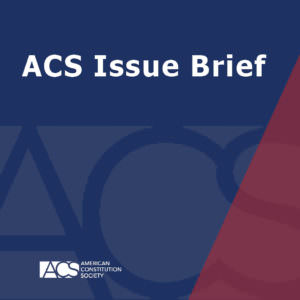Beyond Citizens United v. FEC: Re-Examining Corporate Rights
Founder and President, American Promise
November 4, 2009
 ACS is pleased to distribute “Beyond Citizens United v. FEC: Re-Examining Corporate Rights,” an Issue Brief by Jeffrey D. Clements, an attorney in private practice who specializes in litigation and appeals with the Clements Law Office, LLC. One of the most highly anticipated decisions of the Supreme Court's 2009-2010 term will be the Court's resolution of Citizens United v. FEC. In this campaign finance law case, the Court is considering overruling two of its earlier decisions - Austin v. Michigan Chamber of Commerce and McConnell v. FEC - that upheld the constitutionality of restrictions on corporate political spending at the state and federal levels. Drawing on arguments he made in an amicus brief filed in Citizens United on behalf of five non-profit citizens groups, Mr. Clements argues that, "[w]hether or not the Supreme Court's decision in Citizens United explicitly addresses 'corporate rights' under the Constitution, a holding that overrules Austin and McConnell would rest on the remarkable - and erroneous - assumption that the Constitution provides corporations with First Amendment and Fourteenth Amendment rights equivalent to those of people for purposes of political expenditures."
ACS is pleased to distribute “Beyond Citizens United v. FEC: Re-Examining Corporate Rights,” an Issue Brief by Jeffrey D. Clements, an attorney in private practice who specializes in litigation and appeals with the Clements Law Office, LLC. One of the most highly anticipated decisions of the Supreme Court's 2009-2010 term will be the Court's resolution of Citizens United v. FEC. In this campaign finance law case, the Court is considering overruling two of its earlier decisions - Austin v. Michigan Chamber of Commerce and McConnell v. FEC - that upheld the constitutionality of restrictions on corporate political spending at the state and federal levels. Drawing on arguments he made in an amicus brief filed in Citizens United on behalf of five non-profit citizens groups, Mr. Clements argues that, "[w]hether or not the Supreme Court's decision in Citizens United explicitly addresses 'corporate rights' under the Constitution, a holding that overrules Austin and McConnell would rest on the remarkable - and erroneous - assumption that the Constitution provides corporations with First Amendment and Fourteenth Amendment rights equivalent to those of people for purposes of political expenditures."
Mr. Clements contends that the Citizens United case would lead to an alarming expansion of corporate rights, and discusses how the issues presented in the case have made their way into the mainstream media and prompted warnings to the Court from politicians across the political spectrum about overruling the existing precedent. He argues that these reactions have resulted, in part, because "the Court's decision to examine whether corporations have First and Fourteenth Amendment rights to free speech and political activity has renewed a debate about the place of corporations in our constitutional jurisprudence that has simmered for more than a century." Mr. Clements concludes that "if the Court deems Congress and the states to be powerless to restrict corporate political expenditures ... [s]uch a conclusion by the Court would not only be wildly out of touch with the realities of corporate power in contemporary American life, but would disregard the Court's proper separation over 200 years of the constitutional rights of people from those claimed by corporations."
Read the full Issue Brief here: Beyond Citizens United v. FEC: Re-Examining Corporate Rights
